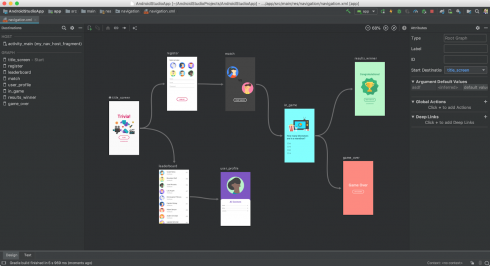
Google released Android Studio 3.3 this week with a strong focus on refinement and quality. The key updates featured a tidied-up UI, and support for IntelliJ 2018.2.2, Kotlin 1.3.11 and Clang-Tidy C++.
According to the company, the updates are a part of a broader plan for solidifying the feature set of the IDE that the developers of Android Studio call “Project Marble.”
In a blog post, product manager Jamal Eason wrote that rather than focusing on large feature introductions, version 3.3 addresses community feedback which suggested tightening up existing features.
“The goal is to ensure Android Studio continues to help you stay productive in making great apps for Android,” Eason wrote. “Since the last stable release, Android Studio 3.3 addresses over 200 user- reported bugs. This release also includes official support for Navigation Editor, improved incremental Java compilation when using annotation processors, C++ code lint inspections, an updated new project wizard, and usability fixes for each of the performance profilers. In addition, saving snapshots on exit for the Android emulator is 8x faster.”
The largest feature included in Android Studio 3.3 is the Navigation Editor, which Eason explains was previewed in an earlier release of the IDE but was held for quality improvements until now. The feature provides a visual editor for XML elements in order to visualize navigation and interactions between different screens of an app in development.
Other UI updates include a streamlined New Project Wizard with wider support for device types, languages and frameworks; the Delete Unused IDE directories option, which will help users clean up excess files from previous versions of Android Studio; and settings for providing Google with feedback from within the IDE.
The update also features updates for building applications:
- reduced time to build for Java applications when using annotation processors
- Gradles’ task creation API, which can cut back on unnecessary task initialization during builds
- single-variant project sync, which can improve project sync speeds by restricting sync actions to only the current build variant
- support for Instant Apps for Android App Bundles, allowing users to deploy Google Play Instant experiences straight from the IDE
For testing, Android Studio 3.3 introduces the ability to launch multiple instances of the same Android Virtual Device, Android 9 system images for the emulator, and improved save speed for saving emulator snapshots.
Finally, the IDE received optimizations that include better performance when using profilers, better memory profiler allocation tracking with expanded options, a network profiler for formatted text in common web formats like HTML, XML and JSON and frame rendering data in the CPU profiler.






